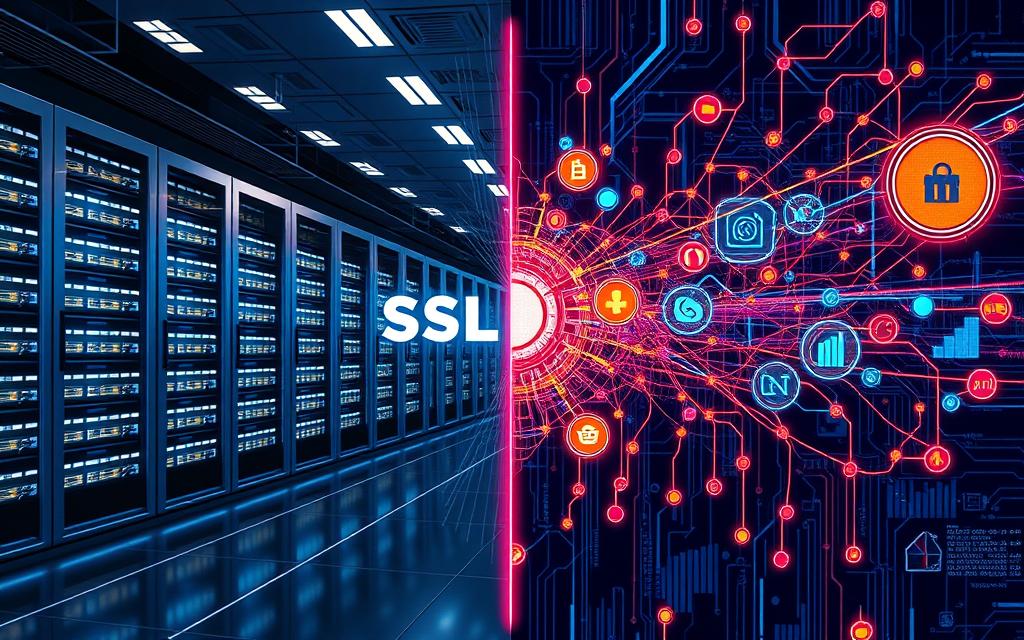When picking a database for your startup, you’re looking at SQL vs NoSQL. This is a big deal in database management and startup tech. SQL databases are traditional and reliable. NoSQL databases are flexible and non-relational.
As you decide, think about data consistency, scalability, and performance. These are key in database management and startup tech.
Your choice between SQL and NoSQL affects your startup’s growth. Making the right database management decision is crucial for your tech needs. In this article, we’ll look at SQL vs NoSQL. We’ll explore their differences, benefits, and drawbacks to guide your decision.
Understanding the Basics of SQL vs NoSQL for Startups
Choosing a database for your startup can be tough. You’ll likely face two big choices: SQL and NoSQL. Knowing the basics of each is key. SQL databases, or relational databases, have a fixed schema. This means the data structure is set before adding any data. They’re great for apps needing strong consistency, like financial transactions.
NoSQL databases, or non-relational databases, have a flexible schema. This makes them perfect for apps needing to grow fast and be flexible, like social media. They’re also good at handling lots of unstructured data, like social media posts and pictures.
What is SQL and Why Do Startups Use It?
Startups often pick SQL databases for their data integrity and support for complex transactions. They’re best for apps needing strong consistency, like banking systems and CRM systems.
What is NoSQL and Its Appeal to Modern Startups
NoSQL databases offer a flexible and scalable option for startups. They’re great at handling lots of unstructured data and can grow easily. This makes them perfect for apps needing to scale and be flexible.
Key Differences in Database Architecture
The main difference between SQL and NoSQL databases is their architecture. SQL databases use a relational model with tables, rows, and columns. NoSQL databases use different models, like key-value and document models. This flexibility makes NoSQL databases popular for startups that need to grow fast.
Popular relational databases include Oracle Database, MySQL, and PostgreSQL. They offer features like SQL support, data integrity, and scalability. Non-relational databases, like MongoDB and Cassandra, are flexible and handle unstructured data well.
SQL databases are best for structured data, while NoSQL databases can handle both structured and unstructured data. This makes NoSQL databases great for apps needing to scale and be flexible, like content management systems and advertising platforms.
When deciding between SQL and NoSQL, think about your startup’s needs. If you need strong consistency and support for complex transactions, a relational database might be better. But if you need a flexible and scalable solution for unstructured data, a non-relational database is a good choice.
The Cost Factor: Budget Implications for Your Startup
Choosing a database for your startup means looking at costs. The price of SQL or NoSQL databases changes based on your business needs. For instance, SQL databases might cost more to start and keep up, especially if you need a team to manage it.
NoSQL databases, however, can save money over time. They handle big data and grow easily. Options like MySQL and PostgreSQL are free from licensing fees. Cloud databases like Amazon RDS and Google Cloud Firestore also offer good value for their reliability and performance.
Here are some key factors to consider when evaluating database costs:
- Initial setup and licensing fees
- Ongoing maintenance and support costs
- Scalability and performance requirements
- Team expertise and training needs

By thinking about these points and picking a cost-effective database, you can save money. This lets you spend more on other business areas. Databases like MongoDB, Cassandra, and Amazon DynamoDB are great for startups. They offer flexibility, growth, and availability without breaking the bank.
Scalability Considerations for Growing Companies
As your company grows, it’s key to think about your database’s scalability. Scalability means your database can handle more traffic without slowing down. There are two main ways to scale: vertical and horizontal.
Vertical scaling means adding more power to one server. Horizontal scaling means adding more servers to the group. NoSQL databases are great at scaling horizontally. They can grow with your data and user base by adding more servers.
On the other hand, SQL databases scale vertically. They can grow by adding more power to the server they’re on. This makes them good for handling more load on one server.
Understanding Scalability Options
There are several scalability options to consider. These include:
- Vertical scaling: adding more power to the existing server
- Horizontal scaling: adding more servers to the cluster
Horizontal scaling is great for companies that grow fast. It lets you quickly add servers to handle more traffic. This way is also cheaper because you can add or remove servers as needed.
Performance Under Heavy Loads
NoSQL databases usually perform better under heavy loads than SQL databases. NoSQL databases are built to handle lots of data and traffic. They can grow by adding more servers.
SQL databases can get slow as the load increases. This is because they can’t handle as much traffic as NoSQL databases.
Data Structure and Flexibility Comparison
NoSQL databases have a big edge over SQL databases in data structure and flexibility. They offer a flexible schema design. This means you can easily change your data structure as needed.
For example, building a social media platform requires storing different types of data. NoSQL databases let you add or remove fields without worrying about the data’s structure.
SQL databases, on the other hand, have a fixed schema design. This makes it hard to change the data structure. But, SQL databases are great for storing data in rows and columns. This makes it easy to link different data sets together.
You can learn more about SQL and NoSQL databases by visiting this resource. It helps you understand the trade-offs between data structure and flexibility.
Some key benefits of NoSQL databases include:
- Flexible schema design
- Ability to handle large volumes of unstructured data
- Scalability and high performance

NoSQL databases like DynamoDB offer a flexible schema design. This is different from MySQL, which focuses on structured schema with strong transaction support. This flexibility is perfect for startups and apps with fast-changing data structures.
By understanding the differences in data structure and flexibility between SQL and NoSQL databases, you can choose the best database for your app.
Development Speed and Learning Curve
Choosing between SQL and NoSQL databases involves looking at development speed and learning curve. Your team’s skills and available resources greatly affect how fast you can implement a database. NoSQL databases, like MongoDB, are often easier to start with, especially for those who know JavaScript.
NoSQL databases offer a flexible schema, making it easier to develop and test quickly. SQL databases, however, need a deeper grasp of database concepts and query languages. For instance, using MongoDB with Node.js is straightforward without needing to learn a new query language.
Team Expertise Requirements
SQL and NoSQL databases have different skill needs. SQL databases demand a solid understanding of database concepts and query languages. NoSQL databases, while simpler, still need knowledge of data structures and distributed systems. Your team’s skills are key to how fast and easy it is to learn.
Available Developer Resources
The resources available to developers, like documentation and tutorials, affect development speed and learning curve. NoSQL databases, such as MongoDB, have many resources, making it easier to start. SQL databases, like MySQL and PostgreSQL, also have large communities and detailed documentation, but might take more time to learn.
In the end, choosing between SQL and NoSQL depends on your team’s skills, available resources, and project needs. By considering these, you can make a well-informed choice. This ensures a smooth and efficient development process.
Security and Compliance Considerations
Choosing between SQL and NoSQL databases means looking at security and compliance. You must make sure your database keeps your data safe from unauthorized access. SQL databases face risks from SQL injection attacks, but using prepared statements can help. NoSQL databases, with their flexible design, might struggle with data validation and access controls.
Both SQL and NoSQL databases have their own security and compliance needs. To protect your data, consider these steps:
- Use encryption to protect sensitive data
- Implement access controls to restrict access to authorized personnel
- Regularly update and patch your database to prevent vulnerabilities
- Use secure protocols for data transmission
NoSQL databases often come with security features like encryption and access controls. It’s also key to follow regulations like GDPR and HIPAA to keep your data safe. By thinking about these points, you can pick a database that meets your security and compliance needs.
SQL databases have standard commands for managing data, which helps with compliance. NoSQL databases offer flexibility and scalability but might need extra steps for compliance. Knowing the security and compliance aspects of both types helps you choose the right database for your needs.
Real-World Use Cases and Success Stories
Choosing between SQL and NoSQL databases is crucial. Many startups have found success with both types. For example, Airbnb uses a mix of SQL and NoSQL databases. This shows how combining approaches can work well.
Some startups prefer SQL databases, like PostgreSQL. It’s great for storing geospatial data and JSON documents efficiently. Others, like Netflix and LinkedIn, have done well with NoSQL databases. They use them for managing big user data and making personalized recommendations. You can learn more about SQL vs NoSQL to see the main differences.
Here are some key points to consider:
- PostgreSQL powers online retail platforms in the e-commerce sector with high transaction volumes.
- NoSQL databases like MongoDB and Cassandra support horizontal scaling for increased workload demands.
- Hybrid approaches, such as using both SQL and NoSQL databases, can provide the best of both worlds.
By examining these examples, you can make a better choice for your startup. Whether you pick SQL, NoSQL, or a mix, the goal is to find what works best for you. This way, you can grow efficiently.
Can OLAP and OLTP Considerations Influence the Choice Between SQL and NoSQL for Startups?
Startups must carefully evaluate olap vs oltp differences when choosing between SQL and NoSQL databases. OLAP requires complex queries and analytics, favoring SQL, while OLTP supports high transaction speeds, making NoSQL a viable option. Understanding these considerations helps startups select the right database to ensure scalability, performance, and efficient data management.
Conclusion: Making the Right Database Choice for Your Startup
Choosing the right database for your startup depends on your business needs. You might choose between SQL or NoSQL databases. The most important thing is to think about scalability, flexibility, and security. This ensures your database supports your startup’s growth and success.
SQL databases are great for keeping data safe and reliable, especially in finance and enterprise software. NoSQL databases, however, are super scalable and handle different data types well. Some startups might even choose a mix of both SQL and NoSQL.
Your database choice should match your startup’s specific needs. Consider your data type, expected growth, and transaction needs. By making the right choice, you’ll build a scalable and future-proof app. This will help your startup thrive.